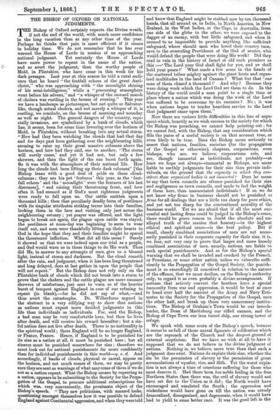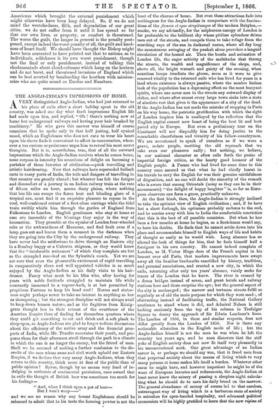THE BISHOP OF OXFORD ON NATIONAL JUDGMENTS.
THE Bishop of Oxford certainly expects the Divine wrath, if not the end of the world, with much more confidence in the long vacation than at any other time of the year. Perhaps he thinks that pain is more efficient if it comes in holiday time. We do not remember that he has ever warned the House of Lords in session of an approaching national judgment. Yet certainly the House of Lords have more power to repent in the name of the nation, and so avert the judgment, than the worthy people of Mold, in Flintshire, who have come in this week for his dark presages. Last year at this season he told a rural audi- ence that he heard " the footfall echoes of the great Anti- christ," who was approaching with " the moonlight shining of his semi-intelligence," while a " precursing atmosphere went before his advent," and "a whisper of the onward march of cholera was rustling in the breeze of evening." This year we have a landscape as picturesque, but not quite so Salvator- like, though actual cholera, and not merely a whisper of it, is rustling, we conclude, on the breeze of morning and noonday as well as night. The general dangers of the country, espe- cially invasions, are symbolized by a bank of clouds, which has, it seems, been for some time lowering over the horizon of Mold, in Flintshire, without breaking into any actual storm. "How had they been watching the clouds that had that day and for days past been gathering over the neighbouring hills, seeming to raise up their great massive columns above the horizon, and how had they said, one to another, The storm will surely come,' and yet it had not, but only a few showers, and then the light of the sun burst forth again. So it was with the atmosphere of their national life. How long the clouds had been lifting up their dark columns" [the Bishop leans with a good deal of pride on these cloud- columns ; they are his pet features' this year, as the foot- fall echoes ' and the moonlight ' were the features of his last discourse], " and raising their threatening front, and how often it had seemed as if God's most righteous judgments were ready to fall upon us. Our cattle smitten upon a thousand hills ; then that peculiarly deadly form of pestilence with its singular attributes striking terror into their families, looking them in the face and visiting only just across the neighbouring estuary ; yet prayer was offered, and the light began to break out again, the plague upon cattle was stayed, the pestilence at noon-day was beginning to seem to wear itself out, and men were thankfully lifting up their hearts to God in the hope that they and their families might be spared the threatened infliction. What did all this mean ? Surely it showed us that we were indeed upon our trial as a people, and God would warn us in these things to do His work. Thus did He, in answer to any attempts of ours, give us a blessed light, instead of storm and darkness. But the cloud cometh after the rain, and judgment, when it has been long threatened and long delayed, does at last gather in upon the people that will not repent." But the Bishop does not rely only on the Flintshire bank of clouds which did not break into a storm to prove that the cholera and the cattle plague are mere summer showers of misfortune, just sent to warn us of the heavier burst of tempest against England in case of our refusing to repent (in blank),—for he did not say of what,—and thus avert the catastrophe. Dr. Wilberforce argued in the abstract in a very edifying way to show that nations as nations must expect more decided judgments in this life than individuals as individuals. For, said the Bishop, a bad man may be very comfortable here, but then he lives after death, and will receive his reward hereafter ; but a sin- ful nation does not live after death. There is no nationality in the spiritual world ; there England will be no longer England, or France, France. Hence, if England is to be punished for its sins as a nation at all, it must be punished here ; but all sinners must be punished somewhere for sins ; therefore we must look out for national punishments far more confidently than for individual punishment§ in this world—q. e. d. And accordingly, if banks of clouds, physical or moral, appear on the horizon, and not much comes of them, we may be pretty sure they are sent as warnings of what maycome of them if we do not as a nation repent. What the Bishop means by repenting as a nation, appears to be subscribing to the Society for the Propa- gation of the Gospel, to procure additional subscriptions for which was, very conveniently, the proximate object of the Bishop's speech. " They saw politicians, with amazed looks, questioning amongst themselves how it was possible to defend England against Continental aggression, and when they were told and knew that England might be stabbed now by ten thousand hands, that all around us, in India, in North America, in New Zealand, in the West Indies, at the Cape, in Australia, from one side of the globe to the other, we were exposed to the dagger of an enemy, with but little safeguard, and when it seemed to us impossible to provide anything like sufficient safeguard, where should men who loved their country turn, save to the overruling Providence of the God of armies, who would defend the people that were doing His work? Did they read in vain in the history of Israel of old such promises as
this The Lord your God shall fight for you, and ye shall hold your peace ?' What made a few arms in the hands of the scattered tribes mighty against the giant hosts and organ- ized multitudes in the land of Canaan V What but that one man of them chased a thousand ?' And why ? Because they were doing work which the Lord God set them to do. In the history of the world could a man point to a single time or place where a nation which was doing the work of the Lord was suffered to be overcome by its enemies ? No ; it was when nations began to tender heartless service to the Lord that judgment came upon them."
Now there are various little difficulties in this line of argu- ment which, heartily as we wish success to the society for which the Bishop was preaching, we cannot help pointing out ; for we cannot feel, with the Bishop, that any consideration which fills the purse of a useful society is on that account true, or even likely to be true. Does the Bishop mean seriously to assert that nations, families, societies (for the propagation of the Gospel or otherwise), chapters, corporations, even bishops, who are, we believe, corporations sole, and are, though immortal as individuals, not probably—at least we hope not always—immortal as Bishops, are more liable to earthly judgments for their sins than private indi- viduals, on the ground that the capacity in which they con- stitute these organized bodies is not immortal? Does he mean to say that town councils are oftener punished for their sins and negligences as town councils, and made to feel the weight of them here, than unassociated individuals ? If so, we do not know why firms in business should not be punished as firms for all dealings that are a little too sharp for pure ethics, and yet not too sharp for the conventional morality of the- business world. Yet we are afraid that if all the most suc- cessful and lasting firms could be judged in the Bishop's sense, there would be grave reason to doubt the absolute and un- alloyed truth of the maxim that honesty—in the highest ethical and spiritual sense—is the best policy. But if small, closely combined associations of men are not neces- sarily punished in their corporate capacity for their sins, it is, we fear, not very easy to prove that larger and more loosely combined associations of men, namely, nations, are liable to such special punishments. And as for the Bishop's special warning that we shall be invaded and crushed by the French, or Prussians, or some other nation, unless we subscribe suffi- ciently to the Propagation of the Gospel Society, the punish- ment is so exceedingly ill conceived in relation to the nature of the offence, that we must decline, on the Bishop's authority only, to regard it as even probably a divine arrangement. If nations that actively convert the heathen have a special immunity from war and oppression, it would be best at once to hand over half the amount of the Army and Navy Esti- mates to the Society for the Propagation of the Gospel, save the other half, and break up those very unnecessary institu- tions. The Bishop of Graham's Town would be our breech- loader, the Dean of Maritzburg our rifled cannon, and the Bishop of Cape Town our iron turret ship, our strong tower of refuge.
We speak with some scorn of the Bishop's speech, because it seems to us full of those unreal figments of edification which are the reproach of the Church and the deepest ground of external scepticism. But we have no wish at all to have it supposed that we do not believe in the divine judgment of nations. Nothing is, we believe, more true than that such a judgment does exist. Nations do expiate their sins, whether the sin be the permission of slavery or the permission of great accumulations of squalor, vice, and filth. Yet the worst expia- tion is not always a time of conscious suffering for those who most deserve it. Had there been less noble feeling in the free Northern States than there was, the evil of slavery would not have set fire to the Union as it did ; the North would have encouraged and emulated the South ; the oppression and wickedness would have gone on till the nation was utterly demoralized, disorganized, and degenerate, when it would have had to yield to some better race. It was the good left in the
Americans which brought the external punishment which might otherwise have been long delayed. So, if we do not mind the wretchedness, filth, and degradation of our great .cities, we do not suffer from it until it has spread so far that our own lives, or property, or comfort is threatened. The worse the guilt, the longer in general is the penalty post- poned, except indeed the worst penalty of all, the guilt and hard- ness of heart itself. We should have thought the Bishop might have been contented to have pointed out that to nations, as to individuals, selfishness is its own worst punishment, though not the final or only punishment, instead of talking this rhodomontade about cloud-columns which hang on the horizon and do not burst, and threatened invasions of England which can be best averted by bombarding the heathen with mission- aries who are quite sound on Exodus and Numbers.































 Previous page
Previous page